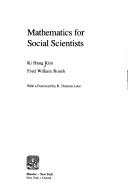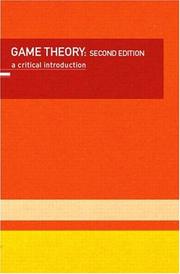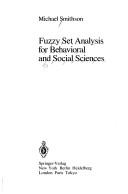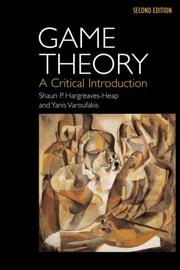| Listing 1 - 10 of 37 | << page >> |
Sort by
|
Book
ISBN: 3031303164 3031303156 Year: 2023 Publisher: Cham : Springer International Publishing : Imprint: Springer,
Abstract | Keywords | Export | Availability | Bookmark
 Loading...
Loading...Choose an application
- Reference Manager
- EndNote
- RefWorks (Direct export to RefWorks)
This textbook provides a comprehensive introduction to mathematical calculus. Written for advanced undergraduate and graduate students, it teaches the fundamental mathematical concepts, methods and tools required for various areas of economics and the social sciences, such as optimization and measure theory. The reader will be introduced to topological, metric and normed spaces, learning about numerical sequences, series, and differential and integral calculus. These concepts are introduced using the axiomatic approach as a tool for logical reasoning, consistency, and formalization of ideas. The book follows a theorem-proving approach, stressing the limitations of applying the different theorems, while providing thought-provoking counter-examples. Each chapter features exercises that facilitate learning and allow students to apply and test important concepts and tools.

ISBN: 0444990666 9780444990662 Year: 1980 Publisher: New York (N.Y.): Elsevier,
Abstract | Keywords | Export | Availability | Bookmark
 Loading...
Loading...Choose an application
- Reference Manager
- EndNote
- RefWorks (Direct export to RefWorks)
Social sciences --- Mathematics --- Sciences sociales --- Mathématiques --- Statistical methods --- Méthodes statistiques --- Mathématiques --- Méthodes statistiques --- Mathématiques économiques --- Social sciences - Mathematics --- Social sciences - Statistical methods
Book
ISBN: 9783658384678 Year: 2023 Publisher: Wiesbaden Springer Fachmedien Wiesbaden :Imprint: Springer Gabler
Abstract | Keywords | Export | Availability | Bookmark
 Loading...
Loading...Choose an application
- Reference Manager
- EndNote
- RefWorks (Direct export to RefWorks)
This book deals with the current economic policy of the People's Republic of China. In addition to a brief overview of the economic history since the founding and the economic models, an overview of both the forms of enterprises and the Chinese labor market is given. The book pays particular attention to the development of China's e-commerce sector. Equally significant are China's environmental issues against the backdrop of the climate crisis. Without innovations, for example in energy production and waste management, the Chinese economy will hardly be able to continue growing. Therefore, one focus of the book is on environmental economic policy. Finally, foreign policy, including the Silk Road Initiative, is examined. The aim of this book is to highlight the above developments. It is aimed at practitioners involved in China business as well as first-year students who want an overview of economic policy institutions and current developments. The content State structure and actors of the economy Current economic development Labour market E-commerce Food, environment and energy policy International Relations The Editor Barbara Darimont is Professor of China Economics at the East Asia Institute of the Ludwigshafen University of Applied Sciences. Before that, she worked for ten years at the Max Planck Institute for Social Law in Munich, where she set up the China Department with renowned Chinese institutions. This book is a translation of an original German edition. The translation was done with the help of artificial intelligence (machine translation by the service DeepL.com). A subsequent human revision was done primarily in terms of content, so that the book will read stylistically differently from a conventional translation.
Economic policy. --- Economic nationalism --- Economic planning --- National planning --- State planning --- Economics --- Planning --- National security --- Social policy --- Social sciences—Mathematics. --- Mathematics in Business, Economics and Finance.
Book
ISBN: 9783662647110 Year: 2023 Publisher: Berlin, Heidelberg Springer Berlin Heidelberg :Imprint: Springer
Abstract | Keywords | Export | Availability | Bookmark
 Loading...
Loading...Choose an application
- Reference Manager
- EndNote
- RefWorks (Direct export to RefWorks)
The book provides an introduction to advanced topics in stochastic processes and related stochastic analysis, and combines them with a sound presentation of the fundamentals of financial mathematics. It is wide-ranging in content, while at the same time placing much emphasis on good readability, motivation, and explanation of the issues covered. This book is a translation of the original German 1st edition Stochastische Prozesse und Finanzmathematik by Ludger Rüschendorf, published by Springer-Verlag GmbH Germany, part of Springer Nature in 2020. The translation was done with the help of artificial intelligence (machine translation by the service DeepL.com) and in a subsequent editing, improved by the author. Springer Nature works continuously to further the development of tools for the production of books and on the related technologies to support the authors. Financial mathematical topics are first introduced in the context of discrete time processes and then transferred to continuous-time models. The basic construction of the stochastic integral and the associated martingale theory provide fundamental methods of the theory of stochastic processes for the construction of suitable stochastic models of financial mathematics, e.g. using stochastic differential equations. Central results of stochastic analysis such as the Itô formula, Girsanov's theorem and martingale representation theorems are of fundamental importance in financial mathematics, e.g. for the risk-neutral valuation formula (Black-Scholes formula) or the question of the hedgeability of options and the completeness of market models. Chapters on the valuation of options in complete and incomplete markets and on the determination of optimal hedging strategies conclude the range of topics. Advanced knowledge of probability theory is assumed, in particular of discrete-time processes (martingales, Markov chains) and continuous-time processes (Brownian motion, Lévy processes, processes with independent increments, Markov processes). The book is thus suitable for advanced students as a companion reading and for instructors as a basis for their own courses. The Author Prof. Dr. Ludger Rüschendorf is professor at the University of Freiburg in the field of mathematical stochastics since 1993. Previously, he taught and conducted research at the universities of Hamburg, Aachen, Freiburg, and Münster.
Stochastic processes. --- Social sciences—Mathematics. --- Stochastic Processes. --- Mathematics in Business, Economics and Finance. --- Random processes --- Probabilities --- Social sciences --- Mathematics. --- Processos estocàstics --- Matemàtica financera
Book
ISBN: 9819923662 9819923654 Year: 2023 Publisher: Singapore : Springer Nature Singapore : Imprint: Springer,
Abstract | Keywords | Export | Availability | Bookmark
 Loading...
Loading...Choose an application
- Reference Manager
- EndNote
- RefWorks (Direct export to RefWorks)
This open access book is the documentary of the Second International Forum on Financial Mathematics and Financial Technology, with focus on selected aspects of the current and upcoming trends in FinTech. In detail, the included scientific papers cover financial mathematics and FinTech, presenting the innovative mathematical models and state-of-the-art technologies such as deep learning, with the aim to improve the financial analysis and decision-making and enhance the quality of financial services and risk control. The variety of the papers delivers added value for both scholars and practitioners where they will find perfect integration of elegant mathematical models and up-to-date data mining technologies in financial market analysis. Due to COVID-19, the conference was held virtually on August 13–15, 2021, jointly held by the School of Mathematics of Renmin University of China, the Engineering Research Center of Financial Computing and Digital Engineering of Ministry of Education, the Statistics and Big Data Research Institute of Renmin University of China, the Blockchain Research Institute of Renmin University of China, the Zhongguancun Internet Finance Research Institute, and the Renmin University Press.
Finance. --- Financial engineering. --- Social sciences—Mathematics. --- Financial Economics. --- Financial Technology and Innovation. --- Mathematics in Business, Economics and Finance. --- Computational finance --- Engineering, Financial --- Finance --- Funding --- Funds --- Economics --- Currency question

ISBN: 0415094038 9780415094030 Year: 2000 Publisher: London: Routledge,
Abstract | Keywords | Export | Availability | Bookmark
 Loading...
Loading...Choose an application
- Reference Manager
- EndNote
- RefWorks (Direct export to RefWorks)
519.83 --- #SBIB:303H64 --- #SBIB:303H15 --- #SBIB:35H006 --- #SBIB:IO --- 519.83 Theory of games --- Theory of games --- Speltheorie --- Methoden en technieken van de bestuurswetenschappen --- Bestuurswetenschappen: theorieën --- Game theory --- Social sciences --- Games, Theory of --- Mathematical models --- Mathematics --- Operational research. Game theory --- Quantitative methods (economics) --- Game theory. --- Mathematics. --- Social sciences - Mathematics --- Social sciences - Mathematics.
Book
ISBN: 0471547441 Year: 1992 Publisher: New York Chichester Toronto Wiley
Abstract | Keywords | Export | Availability | Bookmark
 Loading...
Loading...Choose an application
- Reference Manager
- EndNote
- RefWorks (Direct export to RefWorks)
Bedrijfswiskunde --- Business mathematics --- Mathematics --- Mathématiques --- Mathématiques financières --- Wiskunde --- Social sciences --- -Behavioral sciences --- Human sciences --- Sciences, Social --- Social science --- Social studies --- Civilization --- Math --- Science --- Arithmetic, Commercial --- Business --- Business arithmetic --- Business math --- Commercial arithmetic --- Finance --- -Mathematics --- Business mathematics. --- Social sciences - Mathematics. --- Mathematics.

ISBN: 0387964312 3540964312 1461246806 9780387964317 Year: 1987 Publisher: New York (N.Y.) : Springer,
Abstract | Keywords | Export | Availability | Bookmark
 Loading...
Loading...Choose an application
- Reference Manager
- EndNote
- RefWorks (Direct export to RefWorks)
Social sciences --- Fuzzy sets --- Mathematics --- -Behavioral sciences --- Human sciences --- Sciences, Social --- Social science --- Social studies --- Civilization --- Sets, Fuzzy --- Fuzzy mathematics --- Set theory --- Fuzzy sets. --- Mathematics. --- -Mathematics --- Social sciences - Mathematics

ISBN: 0415250951 0415250943 9780415250948 9780415250955 Year: 2004 Publisher: London : Routledge,
Abstract | Keywords | Export | Availability | Bookmark
 Loading...
Loading...Choose an application
- Reference Manager
- EndNote
- RefWorks (Direct export to RefWorks)
Operational research. Game theory --- Game theory. --- Social sciences --- Mathematics. --- Game theory --- Mathematics --- Sciences sociales --- Théorie des jeux --- Mathématiques --- 305.6 --- AA / International- internationaal --- Games, Theory of --- Theory of games --- Risicotheorie, speltheorie. Risicokapitaal. Beslissingsmodellen --- Mathematical models --- Social sciences - Mathematics
Book
ISBN: 9781071833209 9781071833247 9781071833230 9781071833223 1071833227 1071833200 1071833235 1071833243 1071878832 9781071878835 Year: 2021 Volume: 159 Publisher: Los Angeles, CA : SAGE Publications, Inc.,
Abstract | Keywords | Export | Availability | Bookmark
 Loading...
Loading...Choose an application
- Reference Manager
- EndNote
- RefWorks (Direct export to RefWorks)
"A Mathematical Primer for Social Statistics, Second Edition is organized around bodies of mathematical knowledge central to learning and understanding advanced statistics: the basic "language" of linear algebra; differential and integral calculus; probability theory; common probability distributions; statistical estimation and inference. The volume concludes showing the application of mathematical concepts and operations to the familiar case, linear least-squares regression. The Second Edition gives much more attention to visualization. It also covers some new topics, such as an introduction to Markov-Chain Monte Carlo methods. Also included is a companion website with materials that will enable readers to use the R statistical computing environment to reproduce and expand on computations presented in the volume. The book will make an excellent text to accompany a math camp or a course designed to provide foundational mathematics needed to understand advanced statistics. It will also serve as a valuable reference for those who have completed their formal training but are still interested in learning new statistical methods"--
Social sciences --- Mathematics. --- Statistical methods. --- Quantitative methods in social research --- #SBIB:303H10 --- #SBIB:303H510 --- #SBIB:303H61 --- Methoden en technieken: algemene handboeken en reeksen --- Methoden sociale wetenschappen: statistische technieken, algemeen --- Wiskundige methoden en technieken --- Social sciences - Mathematics. --- Social sciences - Statistical methods.
| Listing 1 - 10 of 37 | << page >> |
Sort by
|

 Search
Search Feedback
Feedback About UniCat
About UniCat  Help
Help News
News